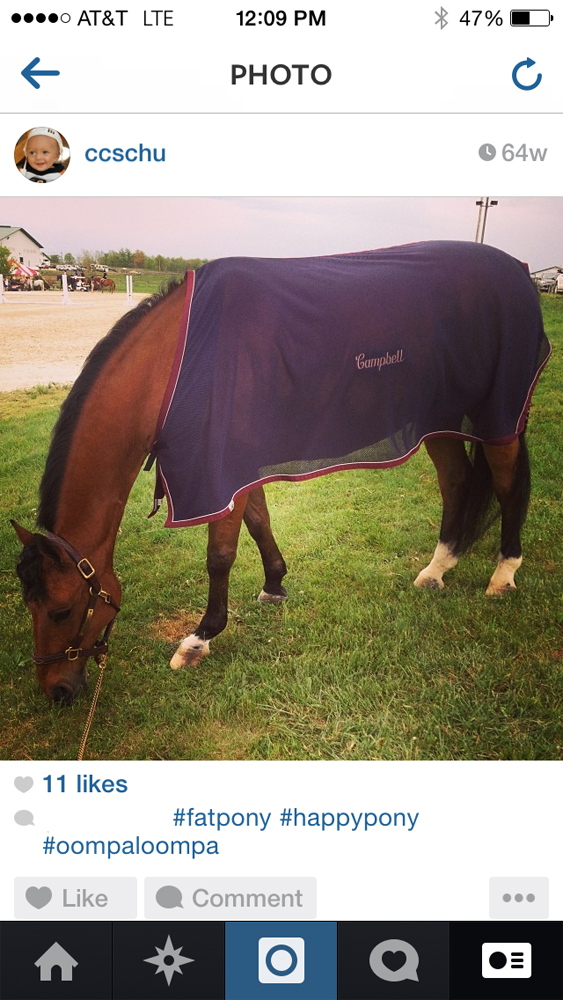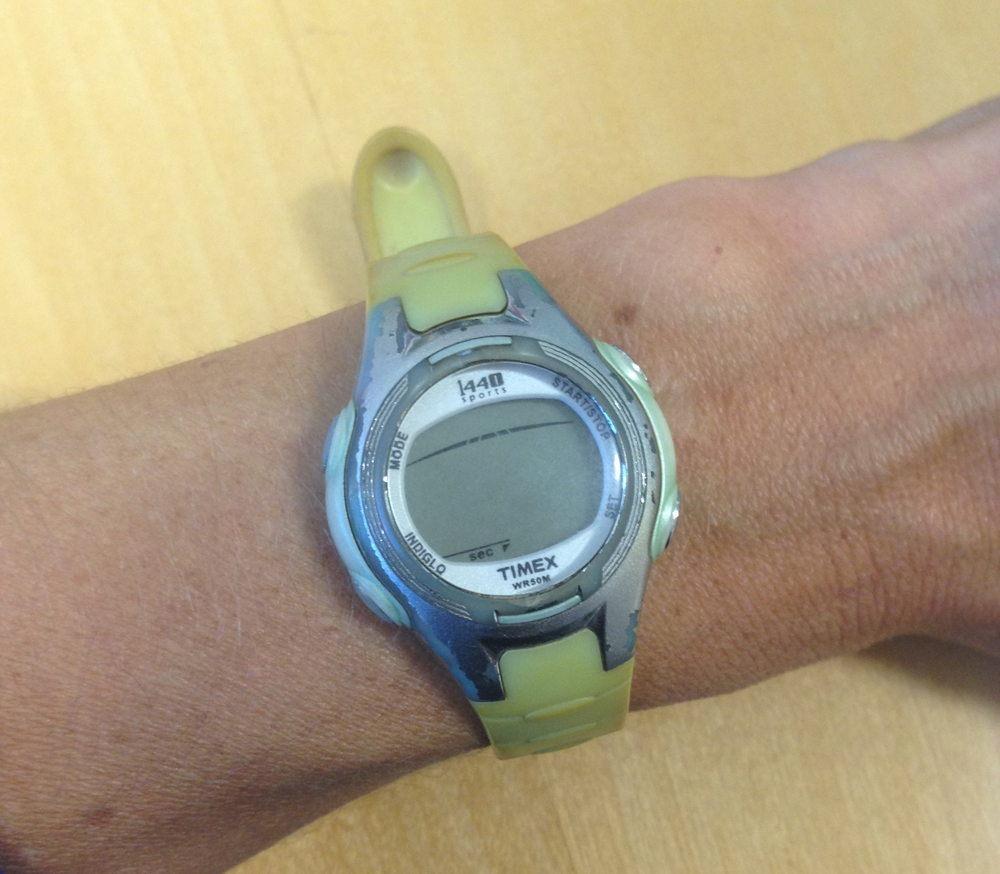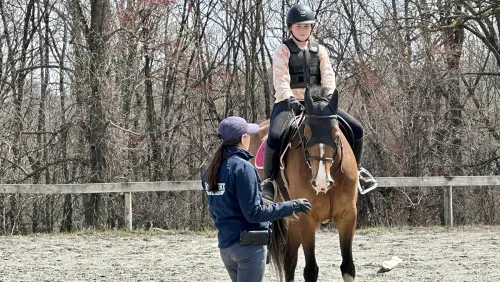For most of us it starts when we’re young. So young that we don’t remember our lives before it, and our lives after are entirely consumed by it. It’s a habit for which we would (and sometimes do) lie, sneak around, or spend money we (or you) don’t have. It’s a four- or five- (OK, maybe sometimes six-) figure-a-month habit that we will never consider a problem.
Even if we did, there are no support groups. No 12-step programs for the . . . yes, I’ll say it . . . addiction.
Yes, horse addiction is a thing.
Our love for horses and riding borders on obsession, and even though we don’t expect your heart to palpitate at the thought of a flashy chestnut with just the right amount of bling, or get chills at the thought of laying down the trip/round/test of a lifetime, gaining a marginal understanding of what fuels our compulsion will serve you well.
While there are many things you might not get about what we do, the brief explanations below are intended to shed some light on what seem to be the greatest mysteries to the non-horse-addicted set: Lessons (Why do we still need lessons?); The Barn (Is that the place where clocks go to die?); Horse Shows (Do these places even have clocks?); Early Mornings (Is 3 a.m., even considered morning?); and Costs (We spend how much to dress like antique British fox hunters and gallop around a ring while a judge watches?).
This guide was developed by a horse-addicted amateur rider, based on observations of the things most often misunderstood—and the questions heard the most often—about horses and riding in the hopes that at least one non-addict will read it and understand a bit more.
Here are some things you non-horse addicts need to understand to make your life with a horse addict more tolerable:
The Lesson:
It never fails. I tell my friends that I am going to the barn for a “lesson” and the typical response goes something like this: “A lesson? A riding lesson? Haven’t you been riding for, like, 30 years? Why do you need a lesson?”
Semantics, people. What we refer to as a “lesson” is what you might call “practice.” And believe me, we need practice. Particularly if we’re over 18 and don’t get paid to ride.
Yes, it might make more sense to call it “practice” but we don’t. This is a sport is so steeped in tradition that we still dress like we’re chasing hounds through the 17th century British countryside. Football players practice. We take lessons.
ADVERTISEMENT
The Barn:
My husband suggested that if science needs proof that black holes exist, it might consider an observational study of “the barn.” Each trip to the barn is something of a time warp.
The barn is a place where two hours inevitably turn into six, and a “quick trip to the barn to hack” is half the day. Most barns are outside of normal cellular networks, so while you should not expect us to respond to calls or texts while we’re at the barn, you should expect to see on Instagram at least 12 bird’s-eye-view photos of our horse’s mane, at least 27 angles of our horse grazing at the end of a lead rope, and at least 15 shots of him lying in his stall, all with proper filtering and hashtags.

Seriously, going to the barn is more than just riding and putting a horse away. There’s grooming, socializing, tacking up, socializing, riding, socializing, untacking and grooming again (and socializing). We can turn mucking a stall at a barn into a social hour. And if we do call you to say we’re just about done at the barn, assume this means we have one more horse to ride, graze, and photograph before socializing more, and then actually leaving.
Early Mornings:
“Ungodly hour” is a phrase most often used to identify the time for which we set our alarms, particularly on weekends. We’re on the wrong side of 4 a.m., more often than a fraternity house, and we greet more sunrises than a rooster coop. It’s usually a safe assumption that the other cars on the road with us at 3:30 a.m., are on their way home from the bars, and not on their way to the barn.
But, believe it or not, waking up at 3 a.m., on the weekends is not something we actually enjoy. It’s a necessary evil, and while it is arguably the greatest justification for eating French fries by 9 a.m., waking up at 3 a.m., is not fun.
So why is it we must be up before the sun if we won’t actually ride until it’s setting? Success in the show ring takes preparation. A lot of it. So, while we might look flawless by the time you watch us compete in the ring, the one truth we all share: we didn’t wake up this way. Just enjoy the fact that you can go back to snoring while we prepare to warm up in a schooling area that resembles a three-ring circus, complete with the tight-ropes and tripwires that are longe lines.
Horse Show Timing:
When I tell my family that I compete in the first class of the day, and the day starts at 8 a.m., they expect to see me dressed, on a horse, and in the ring at 8 a.m. Worse, they assume that showing at 8 a.m., means I will be done sometime before noon.
ADVERTISEMENT
It’s not their fault their geometry-proof-logic has not been shattered by years of experience with post-entries, blue/red warm-ups and open cards. Of officials announcing: “We’re splitting small and large . . . oops, no we’re not,” and “We’re splitting older/younger . . . oops, no we’re not.” Of schooling breaks being inserted and then deleted and replaced with “water and drags.”
Then there is the “not before” time. You might think that showing “not before 2 p.m.” means sometime in the 2 to 3 p.m. range. No. This actually means, cancel dinner because we’re eating McDonald’s on the way home at 11 p.m.

Seriously, this is what a watch for “what time do you show?”
We know this is hard, but please learn to accept a day of the week (e.g., “Thursday” or “Saturday”) as an appropriately detailed response to the question “What time are you showing?” There are just too many factors out of our control. With limited exception (Devon, indoors, etc.) we really don’t know how many people there will be in our division, or the divisions before ours. And if we’re amateurs, we really don’t know how long it might take each of us to get around on the first try.
Horse Show Costs:
Imagine you’ve walked in to Cartier and nothing has a price tag: If you have to ask how much something costs: (a) you can’t afford it, and (b) you probably don’t really want to know.
If you think looking at a prize list gives you some sense of what a horse show costs, I suppose ignorance is bliss. If you do ask (and you probably shouldn’t), we can justify for you every penny we spend preparing for, trailering to, stabling at, and competing in, a horse show. Hint: it’s not for the prize money, or money at all.
I still can’t believe MasterCard hasn’t tapped the horse industry for “Priceless” advertising material.
- New Horse: Cost-of-an-Ivy-League-college-education Dollars
- New Saddle: More-than-your-monthly-mortgage Dollars
- Spending the Winter Horse Showing South of a Frozen Tundra: Price-of-a-new–Maserati Dollars
- Performing for 87 seconds in a ring with only your 1,500lb teammate, all while being judged – subjectively – for a little silk ribbon . . . Priceless!
Riding is expensive. If you’re the type that thinks hockey, golf, or softball are expensive, then the less you know about horse show costs, the better.
This is a lot to take in, and you’re still far from being an expert. But, we hope this information will at least keep you from calling in a search team the next time we disappear to the barn for a lesson, and less frustrated the next time you show up at a horse show at 8 a.m. to watch us compete after 8 p.m.
Christiane Campbell is a lawyer, mom and amateur hunter rider from Pennsylvania. She rides with in the amateur-owner division and has shown at Devon and the Pennsylvania National. You can read all her blogs here.















